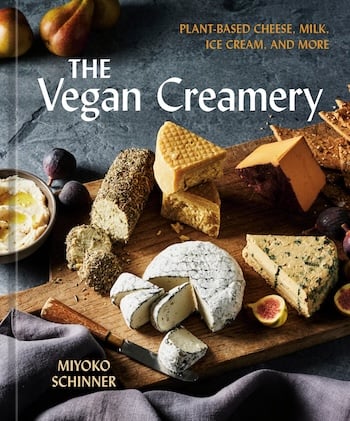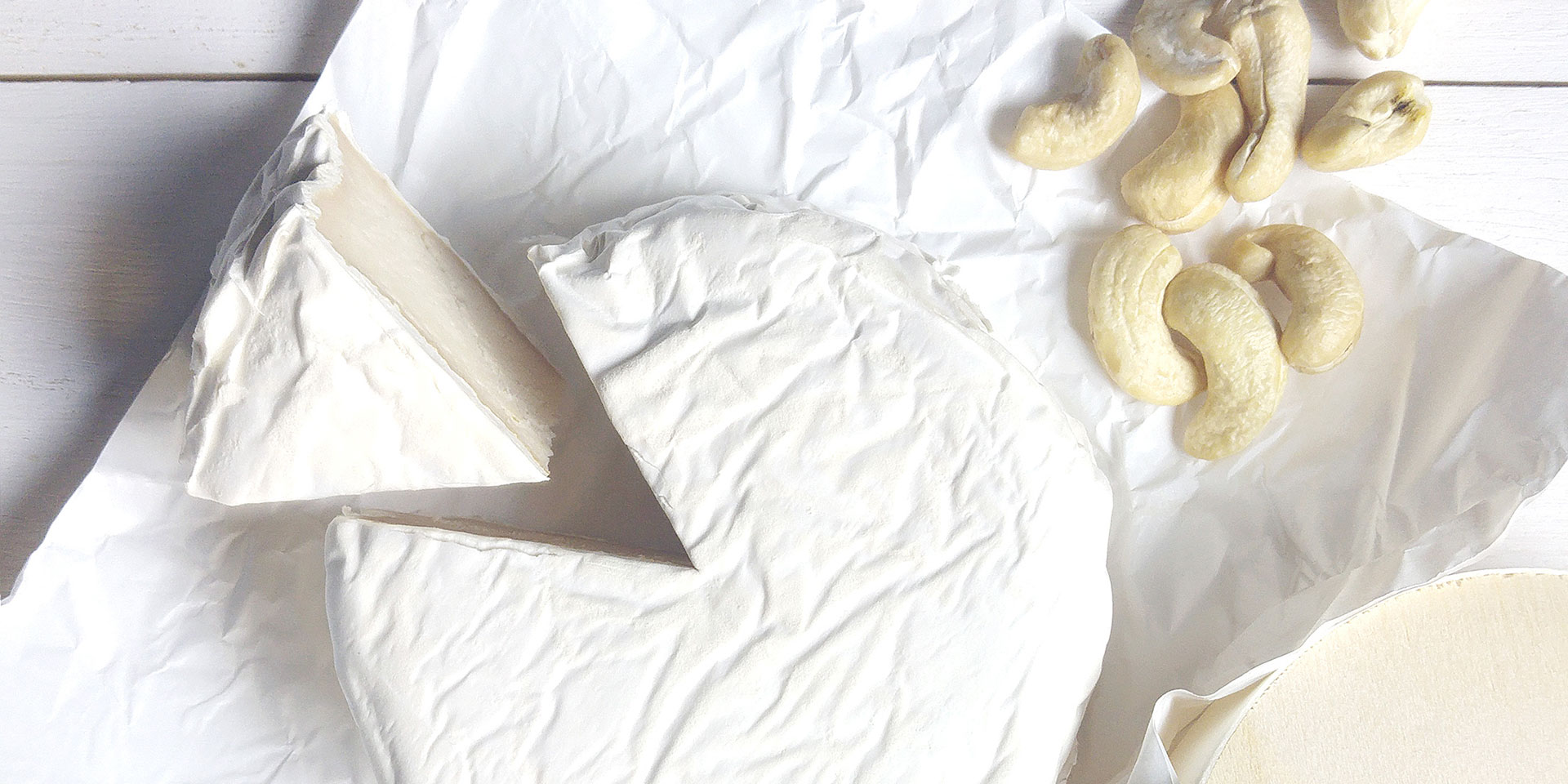How Miyoko Schinner upped the game for vegan dairy
Vegan cheese hasn’t historically been considered the sexiest aspect of the meatless culinary world, and that’s been a boon to its staying power. While “bleeding” pea protein burgers have ebbed and flowed in popularity, nondairy dairy has had time to evolve quietly and consistently. For a while, only vegans and the lactose intolerant were paying it any mind, even as artisanal vegan cheese shops like New York’s Riverdel opened and brands like Rebel Cheese and Rind began to put out stunning aged wheels.
There are massive companies that mix oil and starch together to make most of what’s available in grocery stores, but fermented plant milks that turn into firm, rinded Cheddars and gooey Camemberts are possible. This evolution has been the work of many vegan cheesemakers and recipe developers, yet it’s safe to say that one name has become synonymous with the genre, and it’s a mononym: Miyoko.
Long admired for her vegan cheesemaking enterprise, Miyoko’s Creamery, Miyoko Schinner has just put out the book “The Vegan Creamery,” further cementing her position as the nondairy queen.
Miyoko has had a more than 40-year career in vegan food, beginning with selling poundcakes in Japan and then opening the bakery and restaurant Now and Zen in San Francisco in 1991. Her first four cookbooks were published by a small press affiliated with a commune in Tennessee; it was her fourth book, “Artisan Vegan Cheese” in 2012, that put her on the map more broadly. Suddenly, for those of us paying attention at the time, cashews were everywhere in vegan dairy, becoming sliceable mozzarella and funky blues. She’d mixed traditional cheesemaking techniques and raw vegan knowledge of nut-milk fermentations, and this was revolutionary.
In 2014, Miyoko returned to the food business game, launching Miyoko’s Creamery with just four employees. The publication of “The Homemade Vegan Pantry” followed shortly after, in 2015, and by then her platform had grown enough that the book was released by a traditional cookbook publisher. The name Miyoko became synonymous with thinking about how to free vegan cuisine from the yoke of its flavorless (or off-flavored) supermarket reputation. In Miyoko’s book, quite literally, plant-based mayos, butters and more could be made from scratch, from whole ingredients, to delicious, craveable effect.
When veganism was having its venture capital moment with those ultraprocessed burgers and upstart fast food chains around 2017, Miyoko’s Creamery, too, started to accrue millions of dollars in funding. Suddenly, there was vegan butter — good vegan butter, made from cultured milk just like those cow butters — and wheels of fermented nondairy cheeses available in mainstream markets like Target, all bearing Miyoko’s name.
The creamery took ideological positions as well. It made a point of sourcing ethically produced cashews in Vietnam, an industry beset by human rights abuses in its supply chain. And before the company’s board pushed Miyoko out in 2023, she also scored a legislative victory in the labeling of vegan products as “butter.”

Miyoko no longer has a role at the company that still bears her name (though it recently liquidated its assets and she is looking to buy it back). But “The Vegan Creamery” is her return to form and, in a sense, a reclamation of her title. The book democratizes her recipes and techniques to once again remind the home cook that vegan cheeses, ice creams and milk don’t always have to come mass-produced from the supermarket.
Not every recipe in “Artisan Vegan Cheese” used cashews, but a majority did — and that’s the biggest change in terms of ingredients in this new book, which is much more diverse, heftier and goes much longer on technique. Miyoko also gives the reader a deeper insight into her own story and how she mapped the gourmandism of her youth onto her vegan ethos. There are photos of animals in the book, and many of the cheeses are named after Miyoko’s pets or the rescue animals at her sanctuary, Rancho Compassion; still, for Miyoko, the choice to prioritize animal welfare has not meant renouncing the joys of her younger years traveling Europe, gorging on classic cheeses.
This is Miyoko’s most personal book to date, and the most rigorous. While designed for the home cook, it’s clear that this book is intended to get more of those would-be vegan cheesemakers and chefs up to speed on what is possible with plant-based ingredients. She’s a straightforward recipe developer and writer, too, so it’s also for home cooks up to the challenge of fermentation projects that might seem intimidating at first glance.
There are potatoes, pumpkin and sunflower seeds, soy milk, and ever more possible base ingredients for these cheeses. The most exciting development ingredient-wise is a white watermelon seed kernel from a melon commonly grown in India and China. Because it’s high in protein and neutral in flavor, it acts as the perfect combination of soy (high protein) and cashews (neutral flavor). Miyoko tells readers how to turn it into milk and creamer, as well as an array of cheeses including mozzarella, feta, ricotta and provolone — the list goes on.
The inclusion of such diverse base ingredients means allergens have been taken into account, providing nut-free options like a potato and sunflower seed–based cheese flavored with nutritional yeast, miso and white vinegar, then fermented with a vegan thermophilic culture and thickened with tapioca starch, psyllium husk and agar powder. While this may sound a bit more like a science experiment than cooking — a common feature at times — a photo showing the satisfying stretch on a sourdough grilled cheese seals the deal. Even better, these seemingly esoteric ingredients are used in a wide variety of recipes: You’ll use all those thickeners and the culture again in a potato-cashew Muenster, for instance.
Separate chapters on “fresh and fast cheeses” and “aged and mold-ripened cheeses”— in addition to the milk, butter, yogurt and ice cream chapters — allow the reader to pick their level of involvement. Would you rather a fast ferment (a couple of hours in the fridge) that leans on thickeners and stabilizers to make the potato-cashew Muenster, or four to five weeks for Angel’s Sharp Potato Cheddar brined in red wine? You have a variety of options and get to choose.
“The Vegan Creamery” is valuable on its own but becomes a perfect and expansive complement to “The Homemade Vegan Pantry” when it steps into the more everyday items like yogurt. Miyoko offers soy, soy-cashew, oat-cashew, pumpkin seed-oat, coconut-mung bean, watermelon seed kernel and even almond-chickpea varieties; in the recipe for the latter, she writes that fermentation cuts the beaniness while the proteins of the beans also help create viscosity.
Whatever your tastes or ingredient preferences, there’s an answer in “The Vegan Creamery.” The book becomes an argument for how versatile vegan diets are, and more importantly, what diverse ecosystems they can support. Gone are the days when soy or oat or cashew reigned as the main source of plant-based dairy. Here, Miyoko demonstrates the futility and poverty of that mindset, and in doing so, reaffirms the primacy of the home kitchen as the most interesting site of vegan cooking. It’s not in a lab nor a factory, not even the one that still bears her name: It’s in technique, ingenuity and, sometimes, the patience it takes to wait out four to five weeks of aging and brining.
Get the latest food news from FoodPrint.
By subscribing to communications from FoodPrint, you are agreeing to receive emails from us. We promise not to email you too often or sell your information.
“The Vegan Creamery” Copyright © 2025 by Miyoko Schinner. Photography copyright © 2025 by Eva Kolenko. Published by Ten Speed Press, an imprint of Crown Publishing Group.”
More Reading
30+ things to do with a can of beans
November 4, 2025
In a beefy moment, beans?
November 4, 2025
Waste not, want not with “Ferment,” a new cookbook by Kenji Morimoto
October 1, 2025
For these cocoa farmers, sustainability and the price of beans are linked
September 17, 2025
You haven’t had wasabi until you’ve had it fresh — and local
September 11, 2025
How to make your kids’ school lunch more eco-friendly
August 19, 2025
No-cook meals: 40+ ways to enjoy peak summer produce without turning on your stove
August 12, 2025
Looking to jar up the season? Try a canning club
August 7, 2025
15+ ideas for delicious meatless grilling
July 1, 2025

